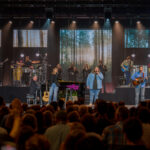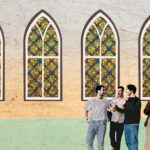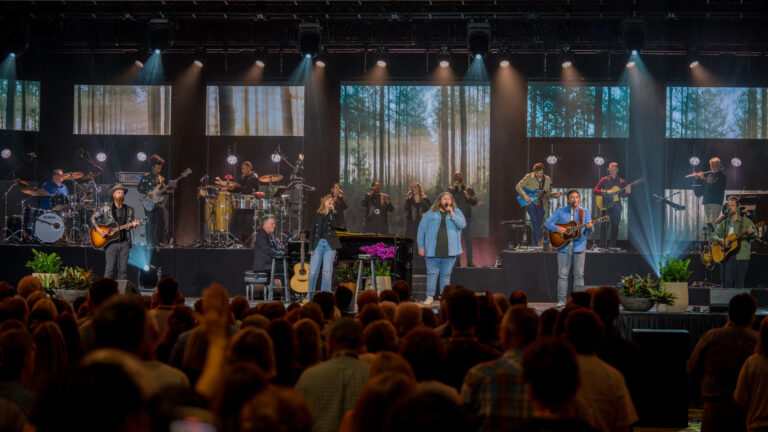Want to make a case for the existence of God?
You’re probably familiar with the classic avenues of argumentation for believing in God. There’s the cosmological case, often associated with Thomas Aquinas, that says everything that exists has a cause and so there must be a first cause (God). Or the teleological argument, which points to the complexity and order of the universe as evidence of an intelligent designer. Then there’s the moral argument, popularized by C. S. Lewis, that points to the existence of objective moral values and duties, which require a moral lawgiver.
The Bach Argument
But there’s another argument I’ve come across worth pondering. Philosopher Peter Kreeft lays it out this way:
- There is the music of Johann Sebastian Bach.
- Therefore there must be a God.
He adds, “You either see this one or you don’t.”
Do you see it? Let me help you.
Beauty as Evidence for God
The heart of this argument for God’s existence is in the appeal to beauty experienced as something transcendent, authoritative, and self-validating.
When we encounter beauty (exemplified here in the music of Bach), we’re arrested. As soon as you see beauty, you’re compelled to love it and know it. There’s no proving beauty, only acknowledging it, experiencing it, and giving yourself over to it. Kreeft says our “sense experience does not demand reasons to believe it, and we usually think it should be believed until proved untrue.”
Other philosophical cases for God put the burden of proof on the believer. We offer reasons to believe in God. But this one—the appeal to aesthetics—puts the burden of proof on the unbeliever. What are the reasons we should not believe in real beauty? Why should we deny our instinct that beauty is real and that real beauty transcends subjectivity?
Beauty and Music
One of the best examples of beauty is found in music. Sure, you can break music into its component parts of melody, harmony, and rhythm, but a scientific analysis can’t capture the essence of music or why it moves us, just as a deep and abiding love for another person cannot be reduced to chemicals in the brain.
Music isn’t just something physical and material. There’s something beyond the notes on the page. In great works of art, we touch the edges of the transcendent because the best of our human creations are consciously or unconsciously reaching for the true, good, and beautiful.
Music, like other art forms, resembles the beauty we see in nature. These aesthetic experiences are like cracks in the sidewalks of secularism, through which shoots of grass and the occasional flower appear. They’re pinholes in the ceiling of immanence, laying waste the claim that nothing exists beyond this material world. They’re whispers in the wind that send a chill up the spine and tell us we’re not alone. There’s something more there.
In his forthcoming book Drawn by Beauty, Matt Capps writes,
The vast riches of these aesthetic experiences are far too great to be neglected or ignored, for they are God’s infinite and transcendent beauty breaking forth in a general way to be enjoyed in creation order, a gift of grace.
Capps also recounts an interview with Jeremy Begbie, who referenced Bach’s Goldberg Variations as showing how a simple chord progression developed in 30 variations allows one to hear more and more with each layer. The genius of Bach’s piece is that after an hour or so, after all “variations,” the beginning of the aria is played again. However, we cannot hear the end “apart from the memory of the extraordinary things Bach has shown us” through its entirety. “In other words, now we hear this aria not simply as a replication of what we heard before; we hear it as varied, replete with diversity. It has gathered to itself a richness, a huge variety of moods and colors. Bach makes us hear more in what we hear, so to speak.”
Music and Eternity
Music resonates with us. It should come as no surprise, then, that a heavenly choir was employed at the dawn of creation, as God laid the earth’s foundation and set the stars spinning into motion (Job 38:7). In other words, the creation of the world was scored, much like a composer adds music to a movie.
Lewis imagined the creation of Narnia taking place through a Voice singing, its sound rising “till all the air was shaking with it. And just as it swelled to the mightiest and most glorious sound it had yet produced, the sun arose.” Whose is the voice? “It was a Lion. Huge, shaggy, and bright, it stood facing the risen sun. Its mouth was wide open in song.”
Likewise, J. R. R. Tolkien portrayed the world’s creation in The Silmarillion as a work of music, with angel-like creatures fashioning the theme of the great Creator, a sound arising “of endless interchanging melodies woven in harmony that passed beyond hearing into the depths and into the heights, and the places of the dwelling of Iluvatar were filled to overflowing, and the music and the echo of the music went out into the Void, and it was not void.” Tolkien later describes the intrusion of evil as discord that the Creator somehow overcomes and sweeps into the overall symphony.
Calvin Miller’s The Singer, an allegorical retelling of the gospel story through analogies of song and music, begins with creation and the song of the Word, heightens the drama of opposition by the World-Hater, before climaxing with the death of the Singer and his subsequent triumph, leading to the spread of the song throughout the world.
If a triune God created the world as a work of art—not out of necessity, but out of love and freedom—then music can be understood, along with everything beautiful in the world, as a faint reflection of the pre-temporal glory of God. It is a tiny echo of what was happening before time and space. What rhythm and harmony are trying to do, however imperfectly, is trace out something of that love and joy that has been forever pulsating between Father, Son, and Holy Spirit.
A Sign, If Not a Proof
Ortlund doesn’t go as far as Kreeft in saying the beauty we encounter in music can be offered as a proof for God’s existence. But he does think belief in God offers something extra, a perk, when you listen to music. “If you believe in God,” he says, “you have a framework for enjoying music that is more satisfying to heart and mind, and more authentic to the actual experience of that enjoyment.”
The inconsolable longing we feel when we encounter true beauty, when the soaring symphony swells toward a melody’s resolution, is the window to another world, whispering to us, singing to us, “There is something more.”
If you don’t get what Kreeft is saying when he says Bach proves the existence of God, the argument will come off as silly and superstitious. But once you feel the full force of what’s being claimed, it’s hard to beat.
If you would like my future articles sent to your email, as well as a curated list of books, podcasts, and helpful links I find online, enter your address.

















